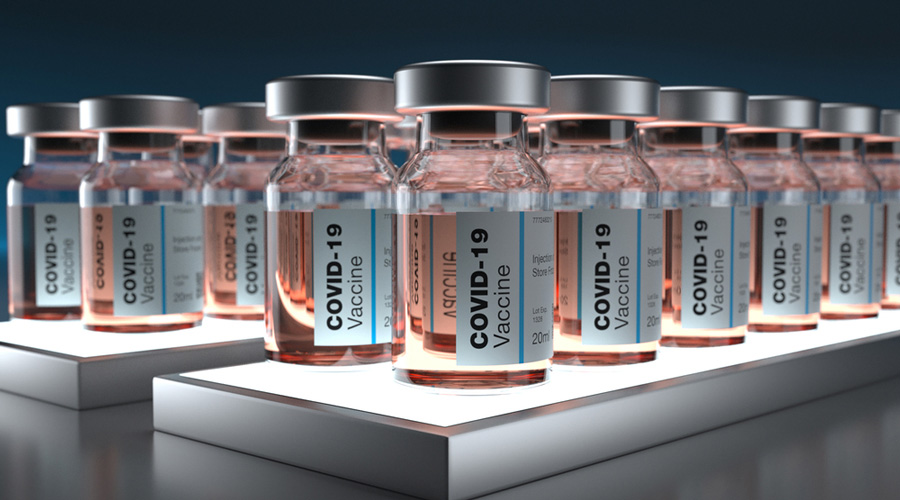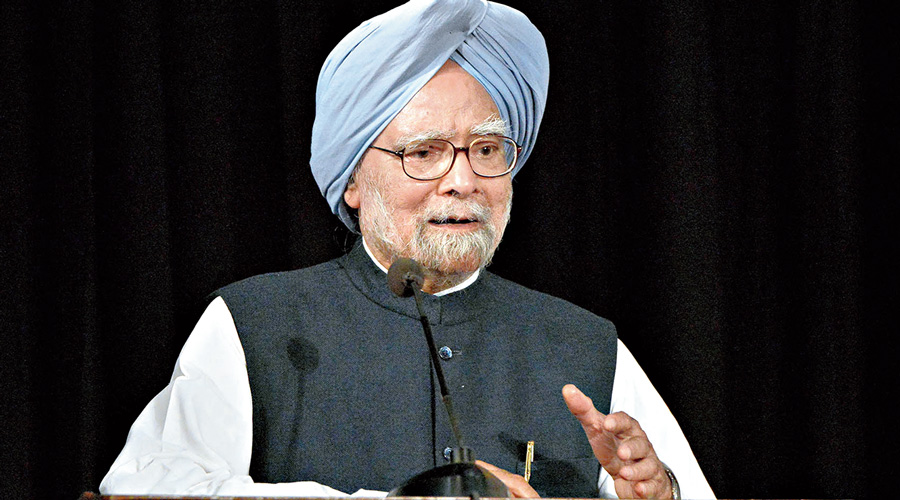Two sets of figures have brought out the enormity of the task confronting the states that seek to procure Covid-19 vaccines, strengthening a perception that the Centre is keen on passing the buck during a national health crisis.
⚫ The Centre’s decision to allow Covid-19 vaccination for adults aged 18 or above more than doubles the target population from May 1. The number of the potential beneficiaries rockets from around 350 million to nearly 900 million, jacking up the number of required doses from 700 million to nearly 1.8 billion.
India currently has access to around 90 million doses per month of vaccines made within the country.
Although production capacities are being ramped up and a scramble for imports has intensified, the surge in demand and the lag in supply augmentation are likely to aggravate vaccine shortages in the coming weeks. Any crisis on this front will then be laid at the door of the state governments, feel analysts.
⚫ Open market pricing (those aged below 45 will have to pay these rates) is another issue.
On Tuesday, G.V. Prasad, co-chairman and managing director of Dr Reddy’s Laboratories, told a television channel that the Sputnik V vaccine that the company intends to import from Russia will be priced at $10 per dose — or Rs 740 per shot. (The government-set price for the vaccines now is Rs 250 a dose but private companies will have the freedom to set pre-announced prices for those aged below 45 from May 1.)
Dr Reddy’s has secured approvals to make the Russian Sputnik vaccine under the guidelines for emergency use authorisation but will meet the initial demand through imports.
Prasad said the imported vaccine would be sold at a price equivalent to $10 a dose — which is the rate at which it is offered everywhere else in the world. But he was quick to add that this would not be the price of the domestically made vaccine.
“We will not profiteer out of this; $10 will be the maximum price… and it will be lower (for the domestically manufactured vaccine),” he said.
However, late in the evening, the company did a quick about-turn by clarifying that the price of the imported vaccine had not been fixed yet and negotiations were still on with the government.
The caution is understandable, given the conspiracy theories and profiteering fears swirling around the Centre’s “liberalisation” of the vaccine policy on Monday night.
Such is the feverish speculation that brokerages have started quick calculations to assess the profits that pharmaceutical companies will earn from their Covid vaccine production strategies.
Motilal Oswal said that considering a base case scenario where the domestically produced vaccine will be priced at an equivalent of $2 per dose, Dr Reddy’s would stand to rake in revenues of $300 million (around Rs 2,220 crore).
The humungous potential demand and the lack of clarity on price have muddled the field with many suspecting that the Centre is now cutting its losses and running, leaving the states to face a possible backlash from the public.
India could have had much larger supplies of Covid-19 vaccines than it has access to at present if the Centre had provided financial support to vaccine makers during the second half or third quarter of 2020 as had many other countries. The Centre did not sign advance purchase pacts with vaccine makers, either, and directed the states not to independently engage with vaccine companies.
India’s pledge of Rs 4,500 crore to vaccine makers, announced this week, should have been similarly made at that time.
“We’ve already seen shortages reported with the pace of vaccinations increasing in recent weeks. The question is, where will the extra doses come from, starting May 1? We’re hoping the government will explain this,” said a public health specialist who requested not to be named.
The Centre has entrusted the responsibility for the expanded vaccination campaign to the states and the private market, saying it would procure 50 per cent of doses and allow the balance to be sold to the states or in the private market.
“We’ve never had a precedent of our states procuring vaccines. This is like the Centre abdicating its responsibility — this could create conditions where states will have to compete with each other to procure vaccines and where states will be at the mercy of the companies from whom they choose to (procure) at rates fixed by them,” said K. Sujatha Rao, former Union health secretary.
The Centre has announced grants to help both Serum and Bharat to ramp up production, but this is expected to take weeks to months. Bharat’s production capacity, for instance, is expected to increase to 100 million doses per month by September 2021.
India has also approved Russia’s Sputnik V vaccine, which will be manufactured in India, but the government has not specified yet how many doses will be available in the coming weeks.
A senior vaccine industry executive who requested anonymity said the decision to open up vaccination for all adults appeared “abrupt and resulting from a mix of strategic and political reasons”.
T. Sundararaman, a community medicine expert and coordinator of the People’s Health Movement, a global network of health specialists, said: “A vaccination campaign of this size would be very challenging — for supplies and logistics. This would allow the Centre to blame the states for any problems or shortages they might face.”
While the Centre has invited foreign companies such as Pfizer and Moderna to introduce their Covid-19 vaccines in India through a fast-track process, experts say India is unlikely to get large numbers of doses from them in the immediate future.
“Most vaccine manufacturers are so oversubscribed relative to short-term supply that there isn’t much spare supply that could quickly be redirected to India,” said Krishna Udayakumar, associate professor of global health at the Duke University in the US.
“It will likely take months, not weeks, for any substantial increase in supply,” he told The Telegraph. “But private sales of domestically manufactured vaccines could help raise additional revenue for those manufacturers that could be reinvested to increase capacity.”
Udayakumar said the large majority of vaccine doses abroad had been government-purchased. The few examples of private sector purchases and sales, he said, have taken place in the Philippines, Pakistan, Thailand and Brazil.
Public health activists fear that private sales can inject inequity into the campaign.
“Ideally, the campaign should have moved downwards from the most vulnerable ages,” said Leena Menghaney, a New Delhi-based public health lawyer. “In the private market, we might see some vulnerable people left out while younger people get access to vaccines.”
Duty waiver plan
The Centre is likely to waive the 10 per cent customs duty on imported Covid-19 vaccines, official sources said.
The government currently levies 10 per cent customs or import duty plus a 16.5 per cent integrated GST and social welfare surcharge on imported vaccines. These taxes would make the imported vaccines costlier than the ones made in India.
On Tuesday night, the government notified a full customs duty waiver on remdesivir’s active pharmaceutical ingredients, on beta cyclodextrin which is used in the manufacture of remdesivir, and on remdesivir injections.
Remdesivir is an anti-viral medication prescribed for the treatment only of hospitalised Covid-19 patients.
The customs duty waiver on vaccine imports is still awaited.











